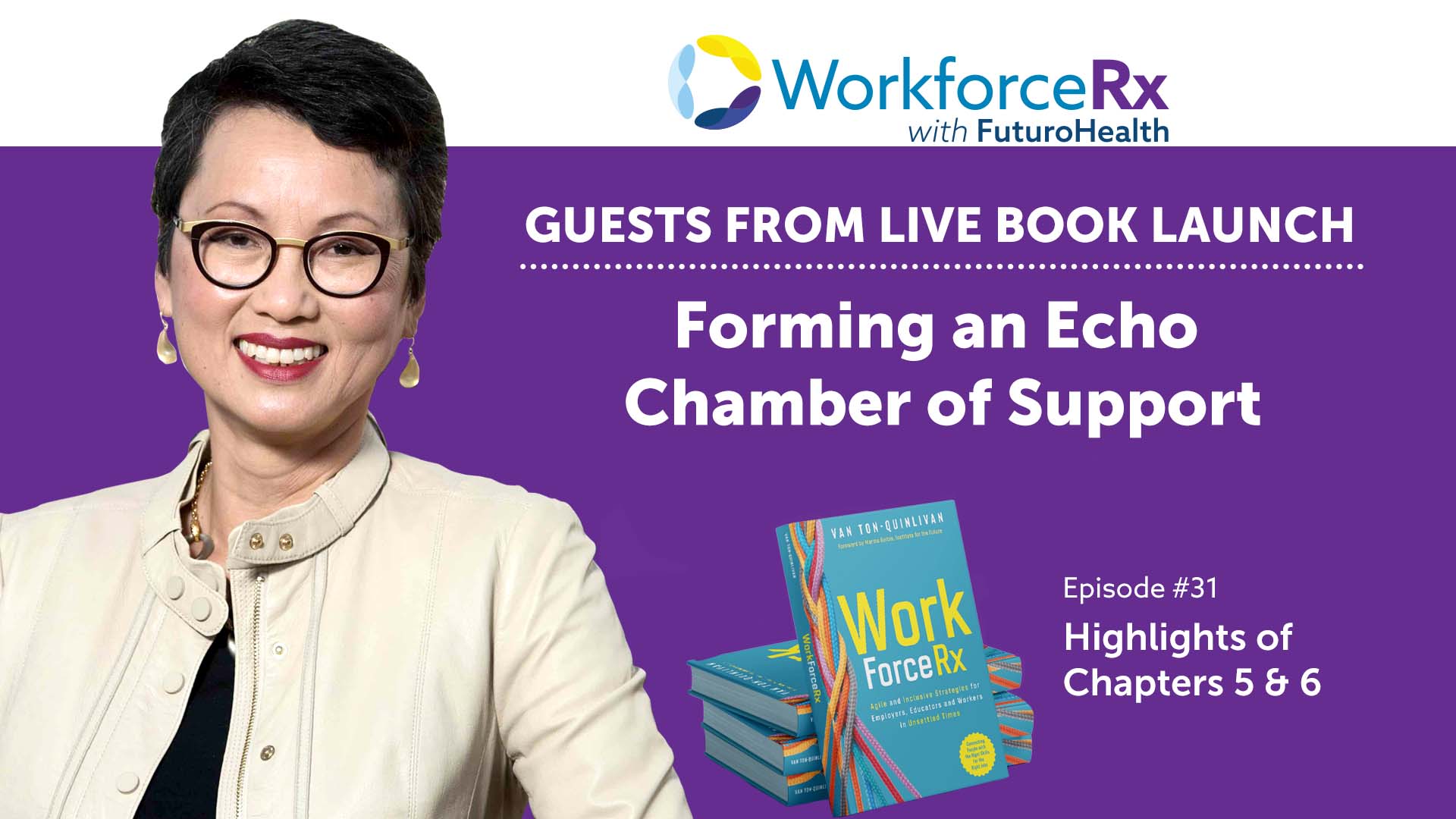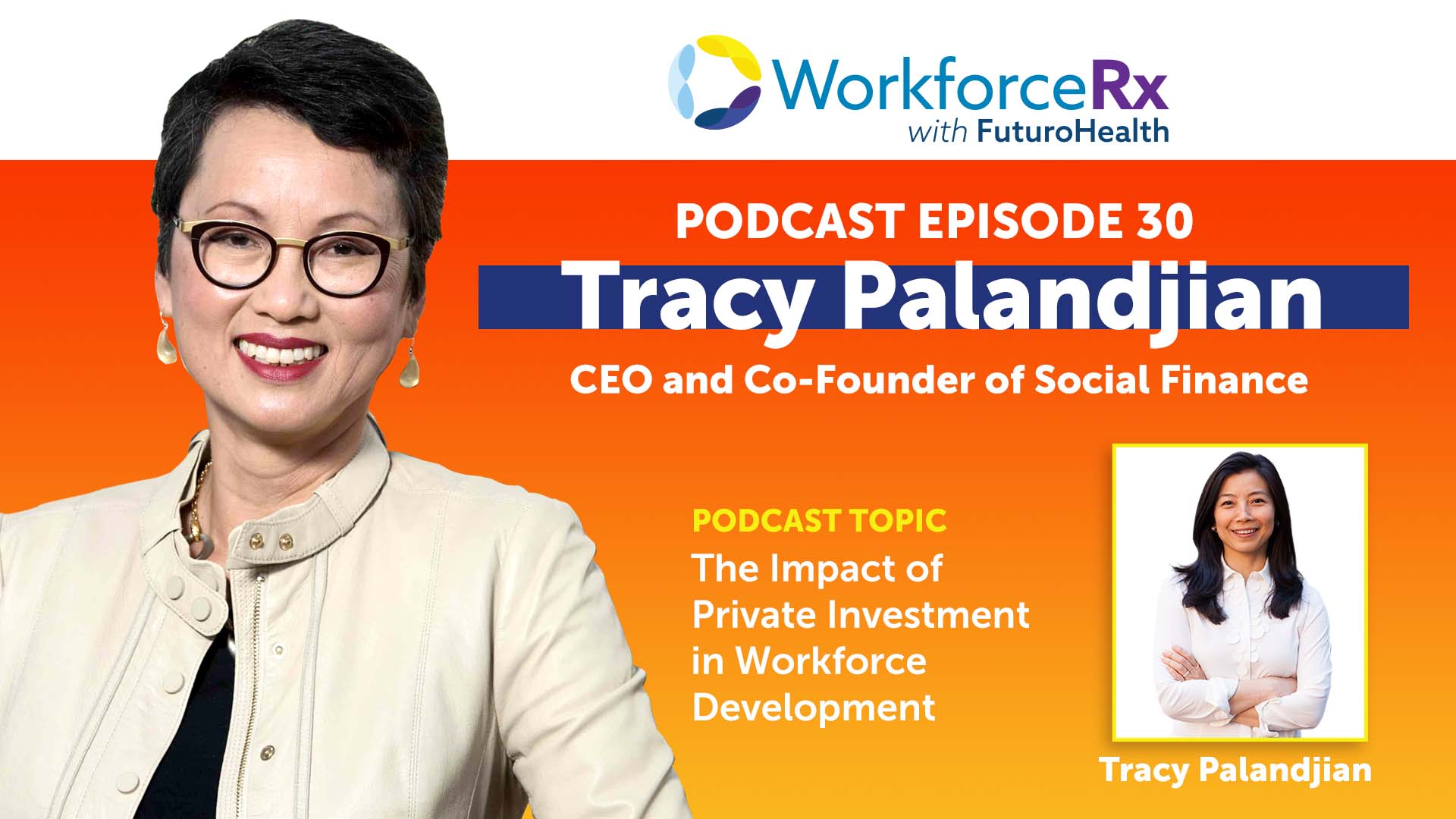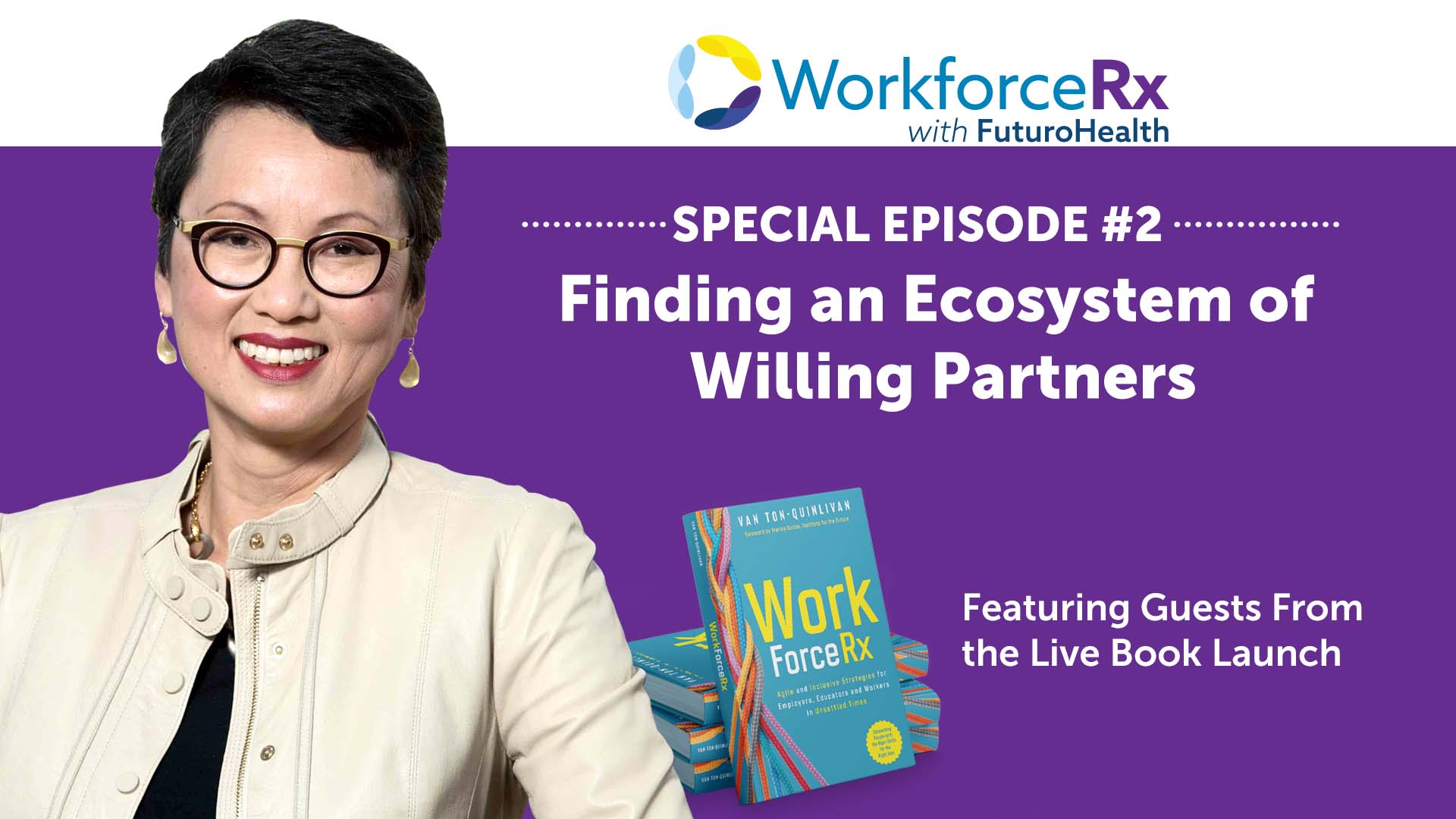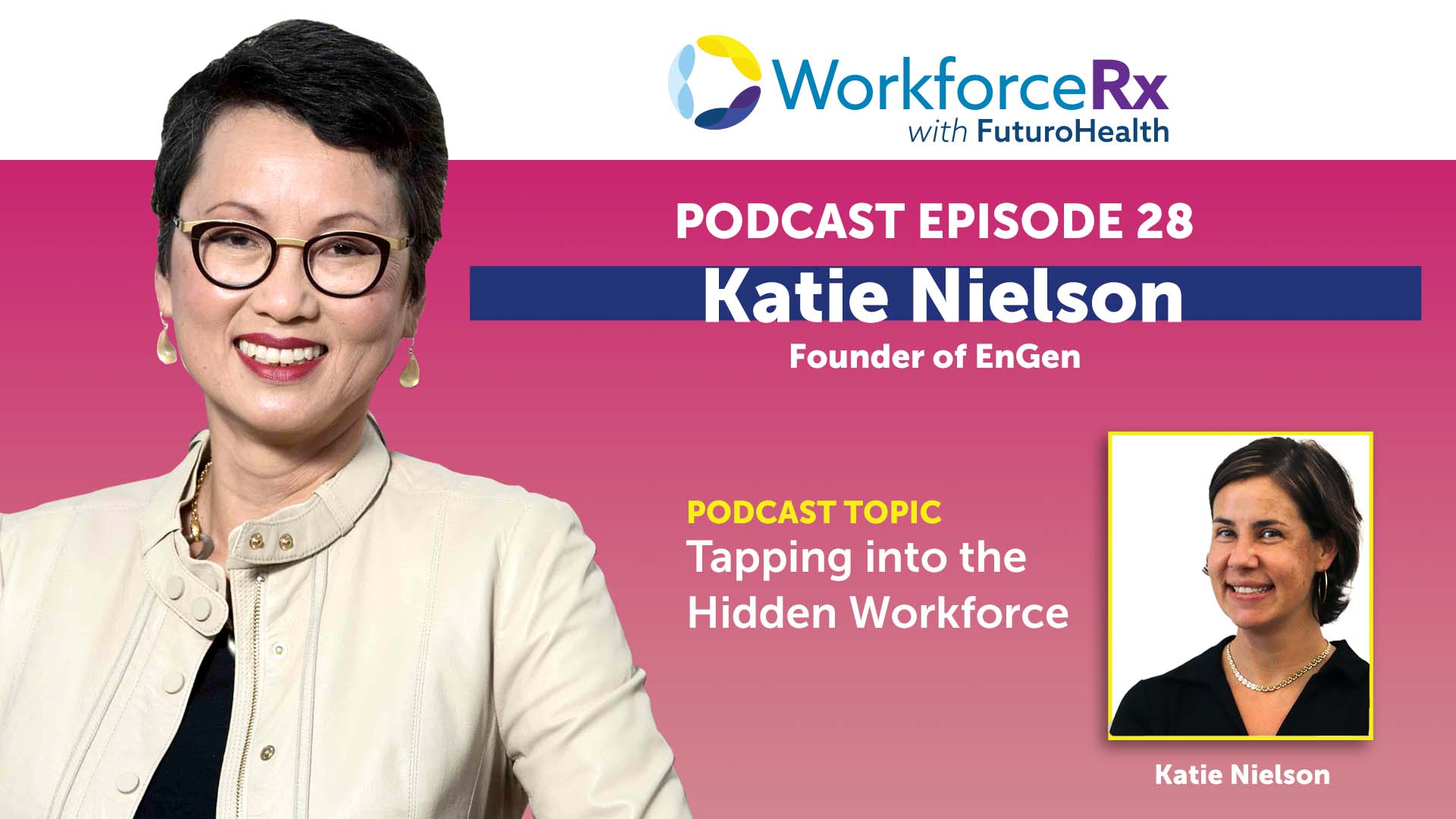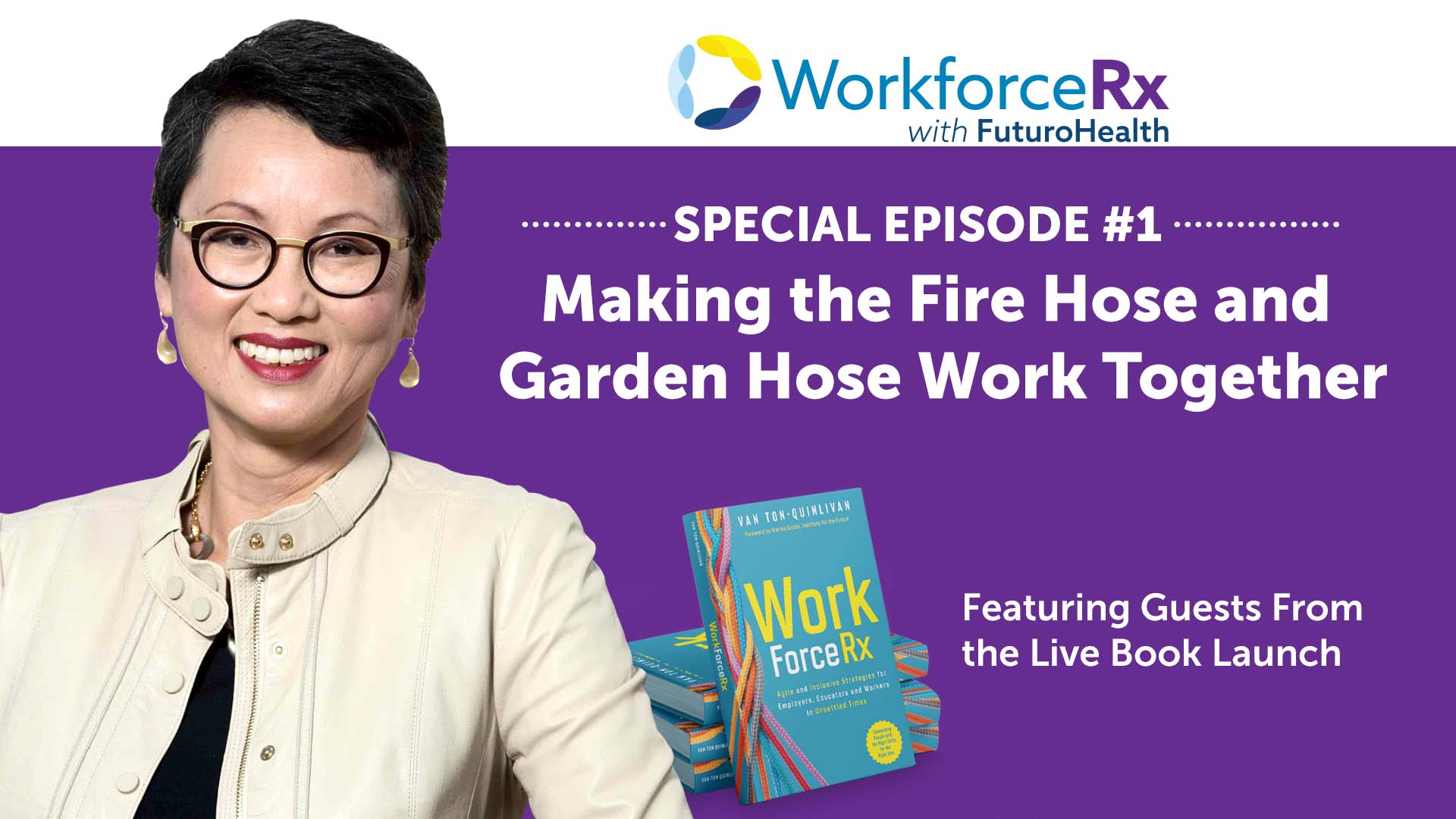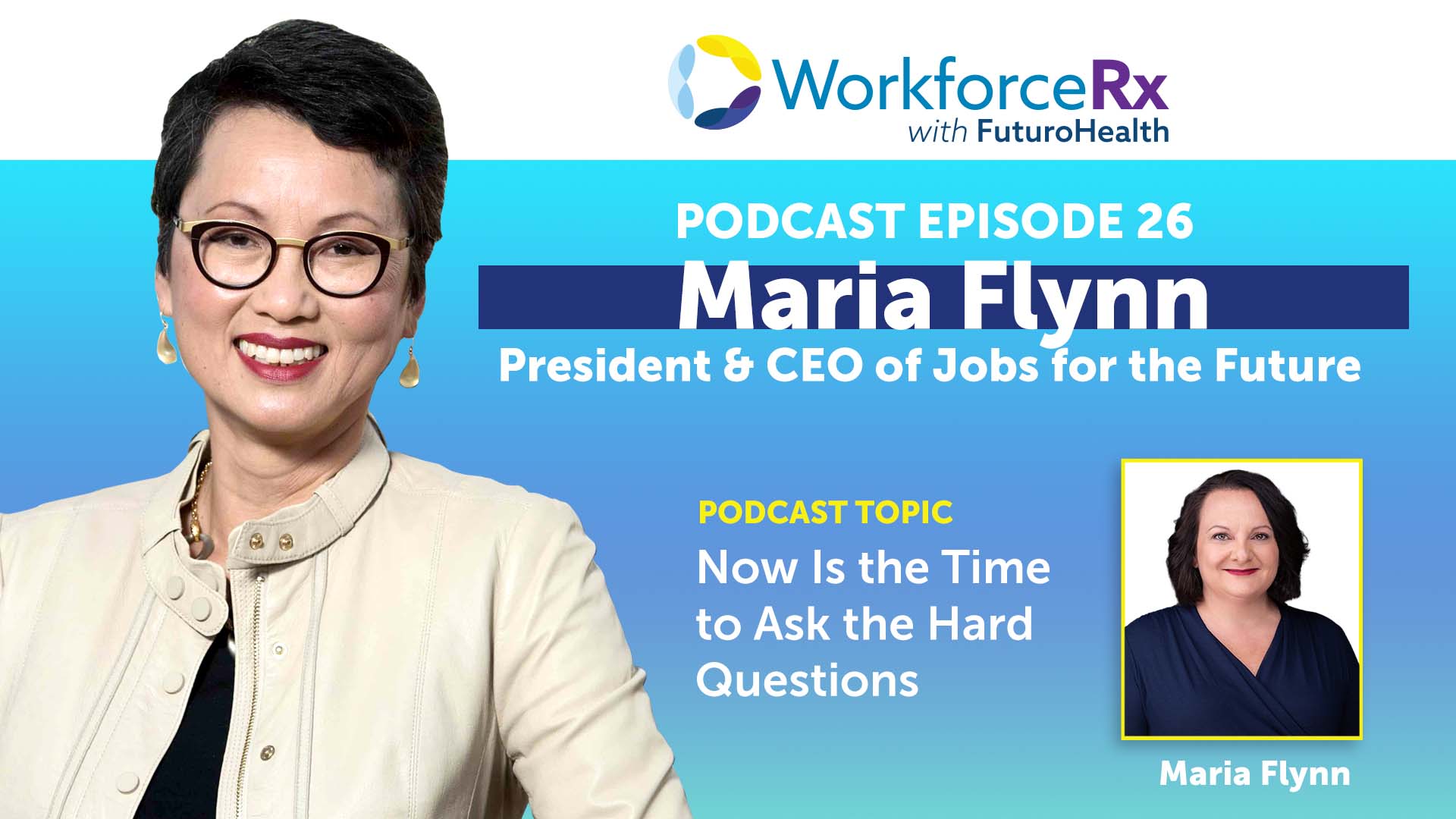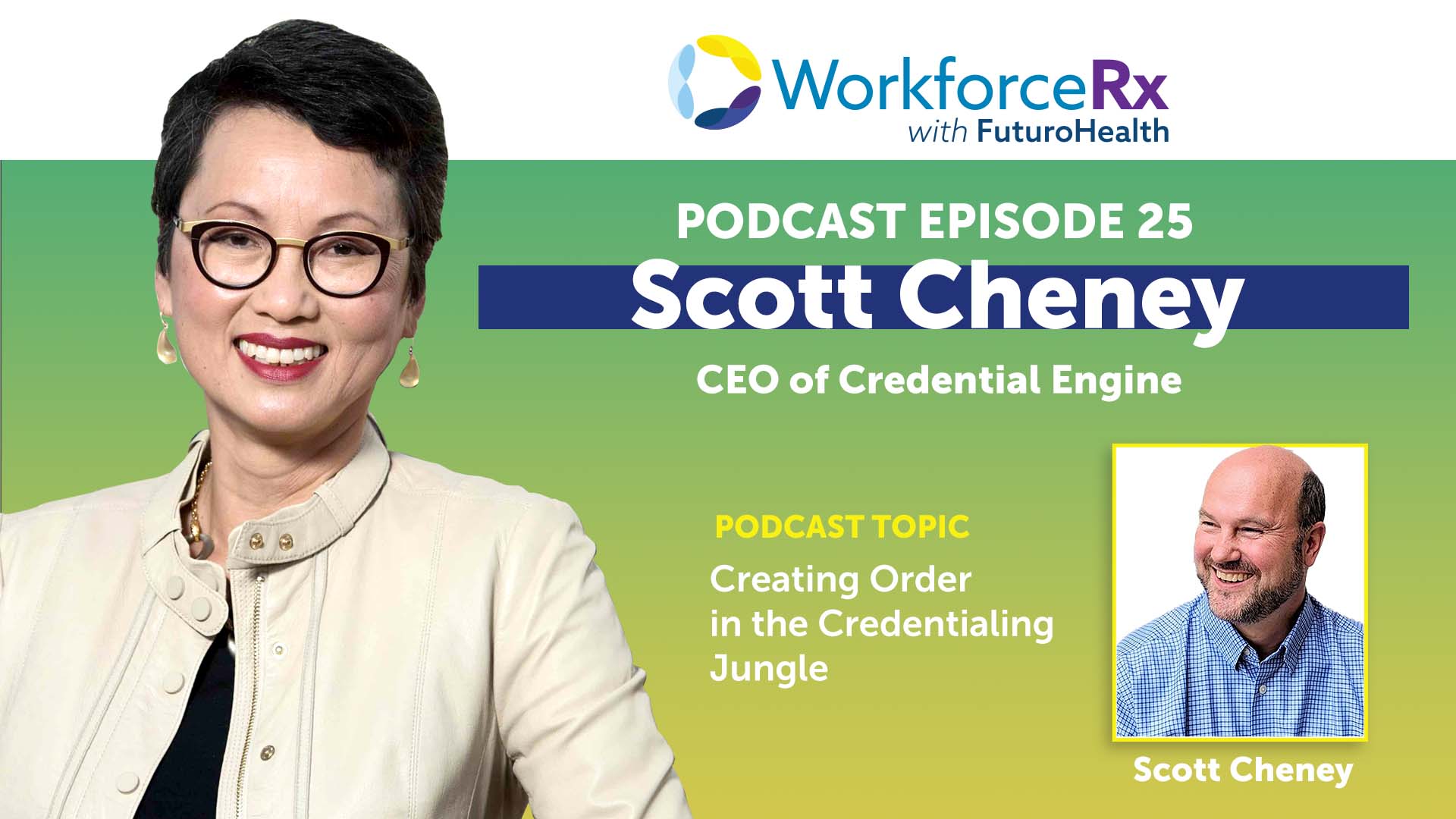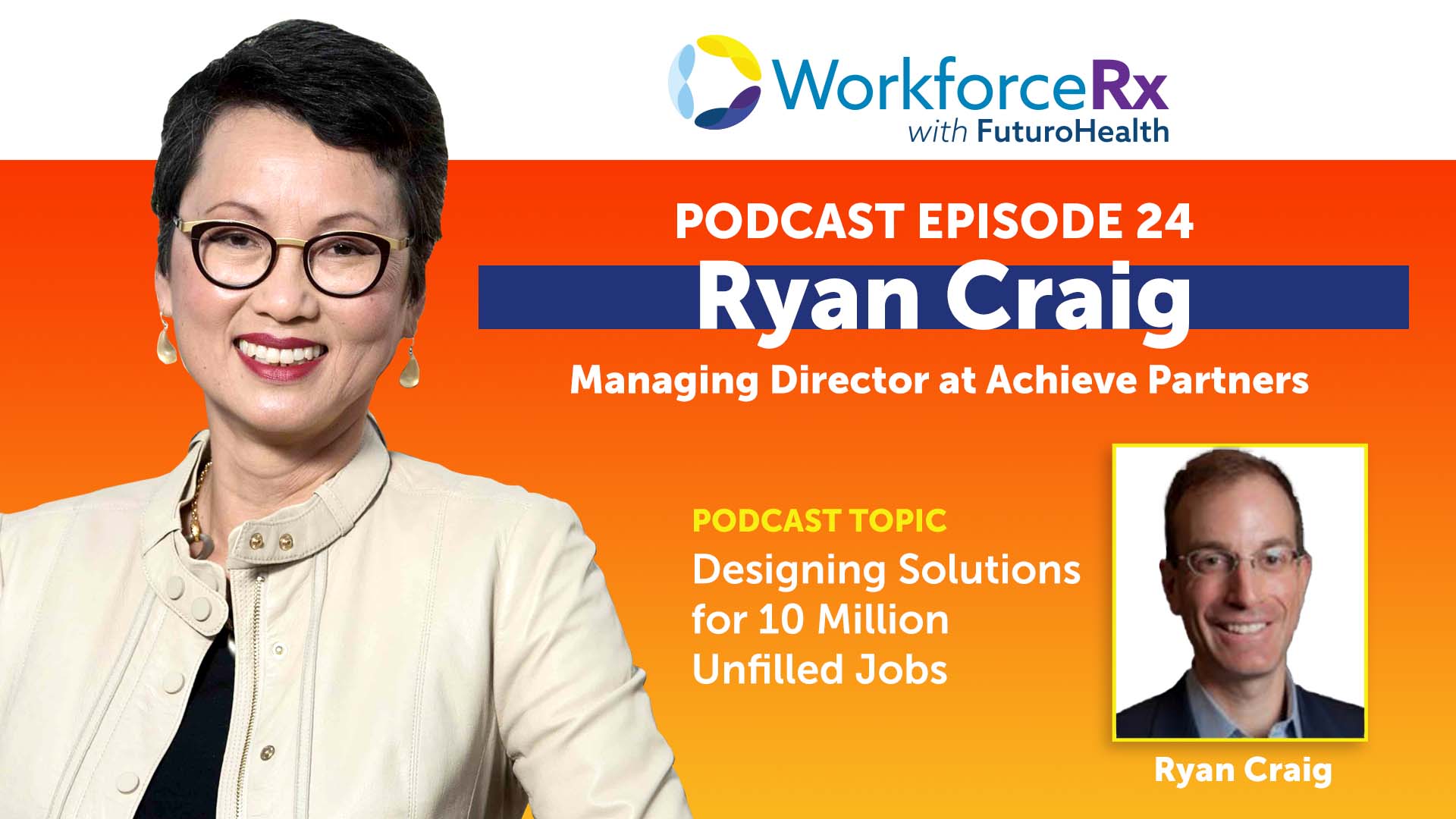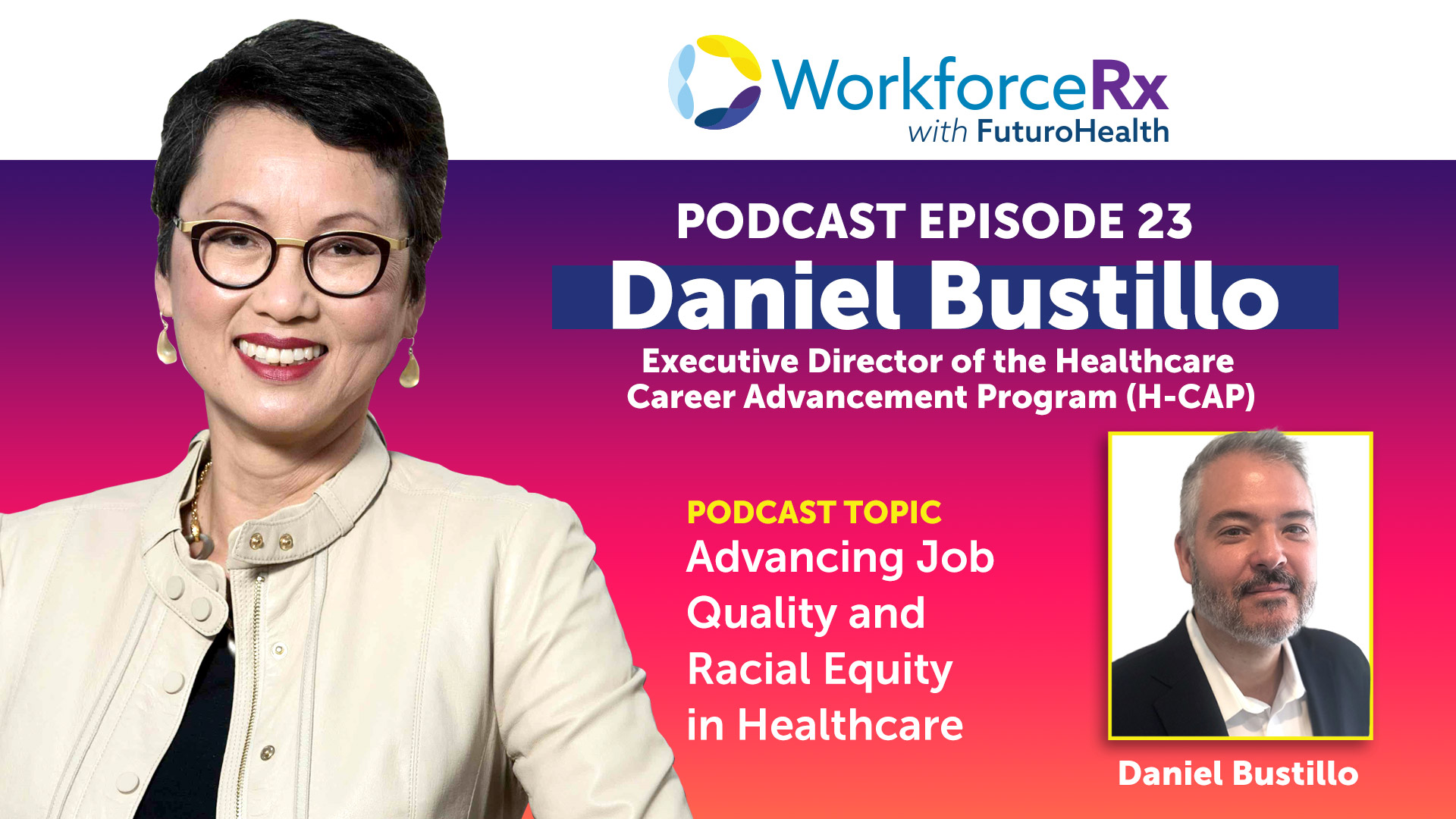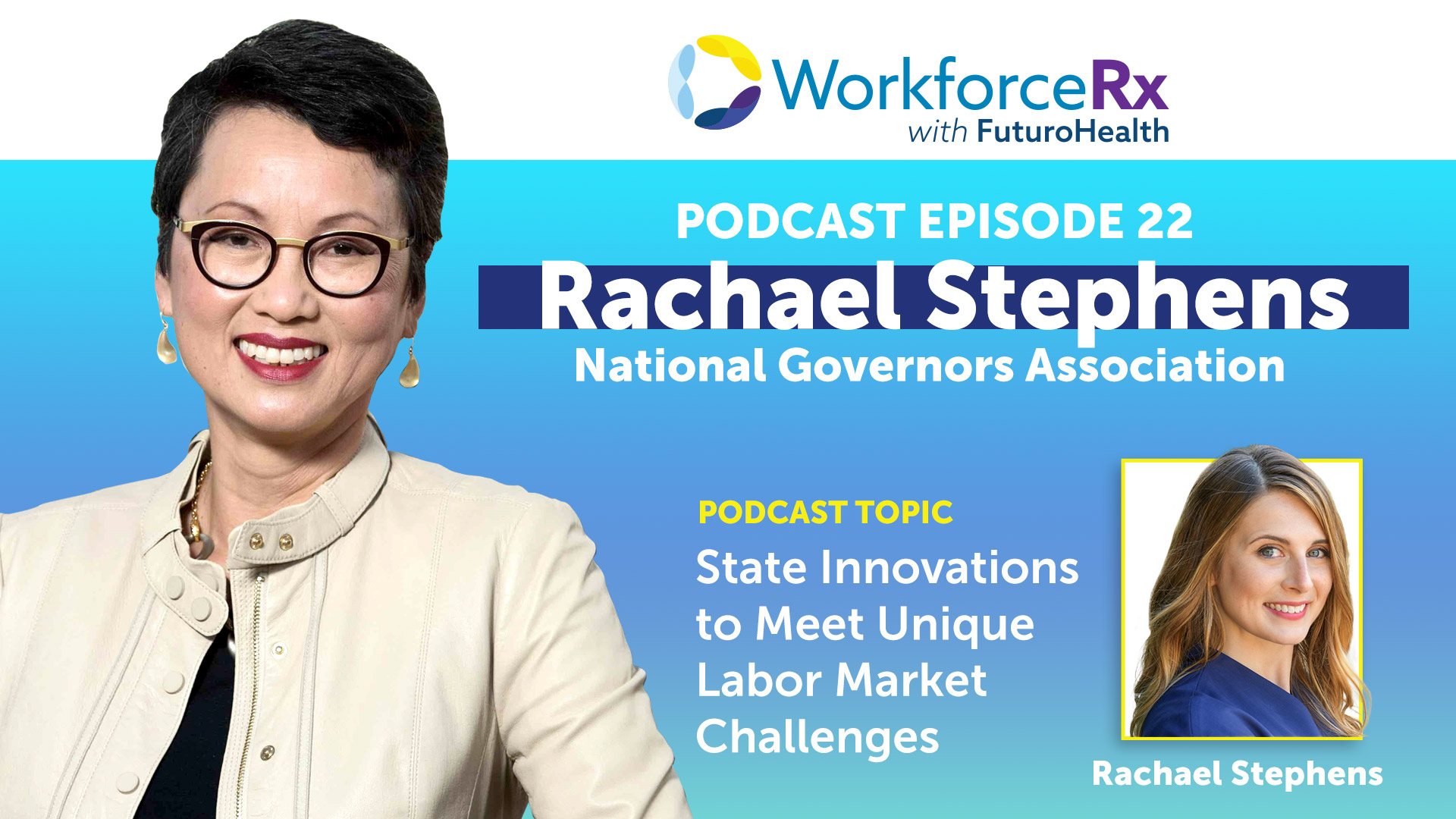Van Ton-Quinlivan, CEO of Futuro Health and host of the show, is also author of the new best-selling book, WorkforceRx: Agile and Inclusive Strategies for Employers, Educators and Workers in Unsettled Times. In this episode, Van welcomes some of the nation’s leading workforce development experts to discuss the strategies and insights from Chapters Five and Six that resonated most with them. Check out their lively discussion about building consortiums of industry players and educators to develop meaningful career pathways, redesigning the community college system, new approaches to credentialing, how to scale up innovations and much more from this powerful new playbook for the future of work. Joining the host are: Chauncy Lennon, Vice President, Lumina Foundation; Earl Buford, Chief Executive Officer, Council on Adult Experiential Learning; Rock Pfotenhauer, Chair, Bay Area Community College Consortium; Amrit Ahluwalia, Editor, Evolllution; Jim Caldwell, Chief Executive Officer, Workforce Incubator; Amy Schulz, Dean, Sierra College; and Steve Wright, ICT Statewide Director, California Community Colleges.
Continue readingTracy Palandjian, CEO of Social Finance: The Impact of Private Investment in Workforce Development
The practice of impact investing — also known as socially responsible investing – has been in place in the U.S. for decades, but more recently, a subset of that field has focused on improving economic mobility. In this episode of WorkforceRx, Futuro Health CEO Van Ton-Quinlivan is joined by Tracy Palandjian, CEO of Social Finance, who is focused on reimagining the role of the capital markets in enabling economic progress. “Our societal challenges are so vast, they require more than what philanthropy and the government can give. So, increasingly, people are asking the question, “What is the role of investors in driving social change?” Tune in to learn about a new way to fund education and training called Career Impact Bonds, collaborations at the state level to support workforce development in key industries, and how these efforts are targeted at people who face significant barriers to workforce participation. This is a great opportunity to learn about innovative alternatives for funding a critical need as labor shortages continue to challenge the U.S. economy.
Continue readingSpecial Episode: WorkforceRx Live Book Launch
Van Ton-Quinlivan, CEO of Futuro Health and host of the show, is also author of the new best-selling book, WorkforceRx: Agile and Inclusive Strategies for Employers, Educators and Workers in Unsettled Times. In this episode, Van welcomes some of the nation’s leading workforce development experts to discuss which strategies and insights from Chapters Three and Four resonated most with them. Check out their lively discussion about giving employers a role in shaping curriculum, making education and training more affordable and flexible, finding an ecosystem of willing partners and much more from this powerful new playbook for the future of work.
Joining Van are: Rachel Unruh, Chief of External Affairs with the National Skills Coalition; Amy Wallace, former Deputy Director at the California Workforce Development Board; Debra Jones & Lynn Shaw, former system leaders with the California Community Colleges; Flannery Hauck, Director with SEIU-UHW; Kai Drekmeier, Chief Development Officer with Inside Track; Fred Freedman, Chief Executive Officer of Pima Medical Institute; and Katie Nielson, Chief Education Officer of EnGen.
Continue readingKatie Nielson, Founder of EnGen: Tapping into the Hidden Workforce
As U.S. employers continue to struggle to find workers, they may want to turn their attention to populations who have the skills they need but lack proficiency in English. This describes many people in immigrant and refugee populations who are currently overlooked by employers and make up part of what is called the “hidden workforce.” On this episode of WorkforceRx, Katie Nielson, PhD, joins Futuro Health CEO Van Ton Quinlivan to describe how she works with employers to tap the potential of this talent pool. Nielson has a growing sense of urgency on this issue due to the fact that by 2030, every baby boomer will have reached retirement age and 97% of net workforce growth will be immigrants and their children. “The biggest barrier to integration in general and, definitely to promotion and advancement in the workforce, is English skills,” she says. “If we think about English as something that we can do to help upskill our workforce, then we’ll be able to get those learners not just the English skills but also the workforce skills that they need to succeed.” Tune in to learn about Nielson’s blend of tech-enabled study and interaction, the wisdom of taking a “backwards design” approach, and how workplace-based language programs can help employers achieve goals around diversity, equity and inclusion.
Continue readingSpecial Episode: WorkforceRx Live Book Launch
Van Ton-Quinlivan, CEO of Futuro Health and host of this podcast series, is also author of the new best-selling book, WorkforceRx: Agile and Inclusive Strategies for Employers, Educators and Workers in Unsettled Times. This episode takes you to one of several live panel sessions held to celebrate the launch of the book. Van welcomes some of the nation’s leading workforce development experts to discuss what strategies and insights from Chapters One and Two resonated most with them, and what they would do differently after reading the book. Check out this insightful discussion about matching people with the right skills at the right time, regionalization of higher education, aggregating the demand for labor, and much more from this powerful new playbook for the future of work.
Joining Van are: Ophelia Basgal, Chair of the Board of Trustees, San Francisco Foundation; Ann Randazzo, retired Executive Director, Center For Energy Workforce Development; Brenda Curiel, Managing Director, Center For Corporate Innovation; Beth Cobert, Chief Operating Officer, Markle Foundation; Tom Cohenno, Principal, Applied Learning Science; David Gatewood, Dean, Shasta College and Deborah Nankivell, Chief Executive Officer, Fresno Business Council.
Continue readingMaria Flynn, President & CEO of Jobs for the Future: Now Is the Time to Ask the Hard Questions
The combination of a unique economic moment and major new funding out of Washington is creating an opportunity to rethink workforce development policies and programs. But will the tough questions be asked that will lead to a significant reshaping of the nation’s approach? Maria Flynn, president and CEO of Jobs for the Future, is hopeful, but is not yet seeing the “blue sky redesign” discussion she thinks is necessary. “We are largely operating public systems that were designed for a different era. A lot of the conversations now are about funding but are not questioning those underlying assumptions of ‘are these the systems that we need for today and the future’? My answer to that is largely no,” says Flynn. There’s a lot to learn in this probing conversation with Futuro Health CEO Van Ton-Quinlivan about transforming American education and workforce systems, the growing corporate role in education, helping employers deliver on diversity, strategies to boost innovation, taking a regional approach to economic development and much more.
Continue readingScott Cheney, CEO of Credential Engine: Creating Order in the Credentialing Jungle
It’s estimated there are one million unique credentials in the United States when you count all of the degrees, certificates, licenses, badges, and apprenticeships offered. But how are employers, educators and learners supposed to determine their validity and whether they might actually help someone advance economically? “It’s our job to make sure information about credentials is accessible in a web-based format and comparable so employers and others can make their own determinations about what’s valid for their purposes,” says Scott Cheney, CEO of the nonprofit Credential Engine. One upside of having a robust, transparent basis for comparison of credentials might be the erosion of entrenched biases toward the value of degrees over other qualifications. “It might be that a really good apprenticeship or an industry license is what you need in order to advance your own preferences and goals.” As he explains to Futuro Health CEO Van Ton-Quinlivan, Cheney thinks more and better data on credentials will also enable customized career pathways and make it easier to see the fundamental value a person brings despite restrictions they may face in access to education. This episode of WorkforceRx is a great opportunity to learn more about this increasingly important area of education and employment and how it might empower learners and job seekers from all backgrounds.
Continue readingRyan Craig, Managing Director at Achieve Partners: Designing Solutions for 10 Million Unfilled Jobs
If you’re wondering why there are ten million unfilled jobs in the U.S. despite having an unemployment rate above pre-pandemic levels, Ryan Craig has part of the answer: traditional higher education is too expensive and can’t keep up with changes in the labor market leaving millions of Americans in need of other ways to obtain the skills that will lead to good jobs. Craig, a prominent investor and thought leader, captures the frictions impeding learners and employers — and offers solutions for them — in both his book A New U: Faster + Cheaper Alternatives to College, and in regular columns for Forbes and other leading publications. But he’s not just writing about these issues. Through his firm Achieve Partners, Craig is working to create modern apprenticeships facilitated by intermediaries between the education and employment sectors. “If you can fast forward a decade and imagine dozens of new apprenticeship pathways emerging in tech and healthcare, I believe we’ll have a very different view of socioeconomic mobility and the American dream.” Join Craig and Futuro Health CEO Van Ton-Quinlivan for a provocative discussion about learning and earning that touches on last mile solutions for students, a GPS for human capital development, “talent as a service” and innovative companies on which to keep an eye.
Continue readingDaniel Bustillo, Healthcare Career Advancement Program (H-CAP): Advancing Job Quality and Racial Equity in Healthcare
If you want proof of how the pandemic has taken a toll on the healthcare workforce, look no further than a recent national poll showing that nearly 30% of nurses, doctors, and allied
professionals might leave their profession within the next year. Daniel Bustillo, whose work as executive director of the Healthcare Career Advancement Program (H-CAP) gives him a national perspective, thinks that number might even go higher. This sobering reality makes organizations like his, which promote innovation and quality in healthcare career education, more important than ever. “Our work is really focused at the intersection of skills attainment, racial and gender equity, and job quality,” says Bustillo. Key to that work is creating opportunities for career mobility, which, as he explains to Futuro Health CEO Van Ton-Quinlivan, can be achieved through a blend of apprenticeships, effective mentorship, and robust supportive services. Check out this illuminating conversation to learn more about reimagining workforce development, a historic opportunity to fund home and community-based services, and H-CAP’s new Center for Advancing Racial Equity and Job Quality in Long-Term Care.
Rachael Stephens, National Governors Association: State Innovations to Meet Unique Labor Market Challenges
The nation’s governors have their hands full navigating an uneven economic recovery and turbulent labor market. Fortunately, they can draw on the National Governors Association Center for Best Practices to help guide their decision making. “Governors are focused on getting people safely back to work and filling jobs that are open right now and looking for ways to get people quickly skilled up for new jobs if that’s what they need. They’re also looking at how they can build on existing efforts to develop career pathways that lead to good jobs in the longer term,” says Rachael Stephens, director of the Center’s Workforce Development and Economic Policy Program. Those efforts include the NGA’s Workforce Innovation Network which, as Stephens tells Futuro Health CEO Van Ton-Quinlivan, is sparking creative solutions in states from Vermont to Alabama. Check out this episode for an informative scan of innovative approaches to today’s complex economic challenges that include supporting a growing on-demand workforce and improving hiring practices to create a more equitable job market.
Continue reading
